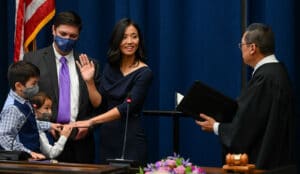
Boston Mayor Michelle Wu takes the oath of office as the city's 56th mayor during a ceremony Nov. 16 accompanied by her husband, Conor Pewarski, and their two children. The oath was administered by Boston Municipal Court Judge Myong Joun. Photo by Jeremiah Robinson | Boston Mayor's Office
New Boston Mayor Michelle Wu outlined a vision of a city government that lifts up residents through ambitious policy goals and nuts-and-bolts services alike.
Taking the oath of office at a midday ceremony at Boston City Hall, Wu credited one of outgoing Mayor Kim Janey’s initiatives as an example of the city government’s power to improve the lives of disadvantaged residents: the free MBTA 28 bus pilot improving transit access and opportunities for Dorchester, Mattapan and Roxbury residents.
“The first time I set foot in Boston City Hall, I felt invisible,” Wu told a packed crowd of VIP’s in the city council chambers. “Today I see what’s possible in this building, and I see all the public servants raising us up.”
Wu has advocated for free MBTA ridership to improve progress and erase social inequities, a proposal that needs state approval and has attracted skepticism among lawmakers and Gov. Charlie Baker.
The first woman of color and female elected mayor in Boston’s 391-year history, Wu polled first among candidates in the September preliminary election to face fellow councilor Annissa Essaibi George in the November election. She outlined a progressive agenda focusing on protecting residents from disparities in housing, health care, economic progress and climate change.
“Our charge is to fight urgently for our future,” Wu said.
Wu takes office with the challenge of tackling the city’s high housing costs and displacement, homeless and opioid crises and uncertainty about the vibrancy of downtown Boston as a commercial hub in the COVID era. Her support for a rent stabilization ordinance modeled upon the one adopted in 2019 in Oregon enjoyed broad support among voters, according to opinion polls.
As a city councilor and a mayoral candidate, Wu was an outspoken critic of the city’s development policies and called for sweeping reforms. She called for rezoning the entire city for the first time since the 1960s, adding predictability and consistency to the permitting process that requires many projects to seek variances.
The new administration also faces decisions about how to protect neighborhoods from rising sea levels, including a potential multi-billion dollar list of coastal defenses recommended by the Climate Ready Boston studies. The potential for federal infrastructure funding is likely to factor into the scope of the city’s plans. Wu’s “Green New Deal” platform would assess a new fee on property owners to pay for stormwater management, as flooding more frequently infiltrates coastal neighborhoods.
Wu also has cited opportunities to build a new neighborhood in the Widett Circle and Frontage Road area, including the city-owned Frontage Road tow lot and food wholesalers’ home that was acquired in 2020 by a private developer. Wu’s goals include a wider range of housing prices, and more inclusiveness and public access than the Seaport District’s recent development boom.
U.S. Sens. Elizabeth Warren, a former law professor of Wu’s and her mentor, and Edward Markey lauded Wu’s focus on climate issues.
Meeting with reporters after the ceremony, U.S. Rep. Ayanna Pressley said Wu’s victory gave her a “decisive mandate” to pursue a progressive equity-based agenda.
In her farewell address, Janey encouraged Wu to “center equity in all that you do. I know that Boston is in good hands.”




 |
| 

